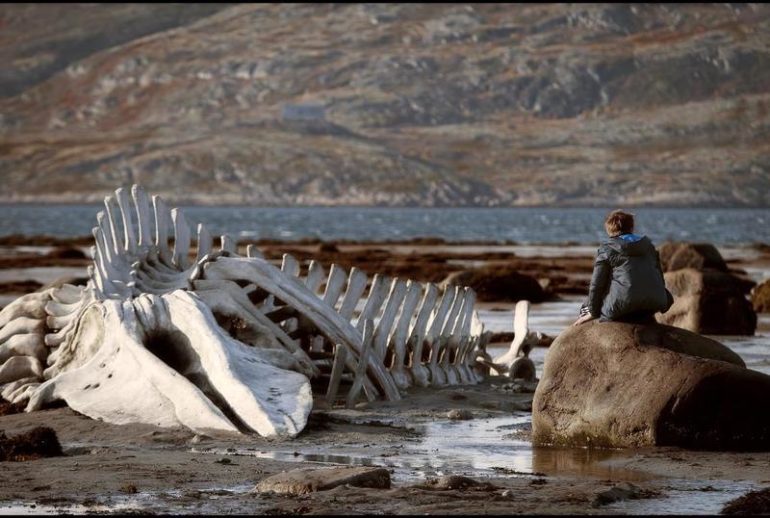With a title like Leviathan, you can be assured that this film is heaving with scope and scale. It’s a word heavy with meanings, any of which could be applied to Andrey Zvyagintsev’s drama. It’s not an assault on the senses like its 2012 documentary namesake, but it ropes the audience in with questions and challenges that linger in the mind. In its oldest Biblical sense, a leviathan is a giant sea creature, more often interpreted as a whale. The area of the Barents Sea where Leviathan is set is often visited by whales. One of the most memorable sights from the film is a giant whale skeleton, as glimpsed in the film’s posters and advertising.The original leviathan threatens God’s creation, though it’s more human forces that threaten the idyllic fishing village at the heart of Leviathan.
All talk of sea creatures aside, the biggest Biblical reference point in Leviathan is the Book of Job. This particular sliver of the Old Testament is fertile material for filmmakers, custom-made for commentary (Recent onscreen variations include A Serious Man and The Tree Of Life). Our Job substitute this time around is Nikolai (Aleksei Serebryakov), a mechanic living with his second wife Lilya (Elena Lyadova) and his young son Romka (Sergey Pokhodaev) in the village. Their lives are quiet, yet happy, but it’s all starting to unravel. The film opens with Nikolai meeting his old army pal Dima (Vladimir Vdovichenkov) off the train from Moscow. Dima is now a respected lawyer, and Nikolai is bound in a legal quagmire.
Nikolai’s legal problems are where we might find reference to Leviathan by Thomas Hobbes, the classic argument for a social contract whereby some freedoms are sacrificed by the masses to escape the fractious state of nature. The mayor of the village (Roman Madyanov) is seeking to evict Nikolai and his family, with rumours suggesting he wishes to build a mayoral palace in place of Nikolai’s house and garage. Leviathan dares to mock the leviathan that is the Russian establishment; this vast land has adopted the commonplace social contract of democracy, but its abuse is accepted by most, and those that rally against it seem doomed, as Job once was. Vadim the mayor is a drunkard, and as such is an easily-mocked yet threatening representation of Russian government. His bodyguards and status give Vadim the confidence to come to Nikolai’s house in the dead of night to issue vodka-fuelled threats. When Nikolai reports this to the police, his antagonism get him arrested. Meanwhile, Dima visits Vadim in his office featuring draped flags and Vladimir Putin’s portrait on the wall. The village is in thrall to this version of the social contract. Witness the speed at which a judge reads out the testimony and findings of Nikolai’s case. The law dominates the landscape, but in turn the law is flouted by the lawmakers. Job is doomed once more.
Leviathan is an active commentary, but the story drives it. The hot-headed Nikolai is fighting a worthy fight, but he also brings a lot of strife on himself with his anger. Lilya clearly loves him, but her eye is not above straying. Meanwhile, Romka’s teenaged rebelliousness has shades of his old man’s temper. Dima makes a good counterpoint, a calmer presence but also flawed. As the case rumbles on, the characters’ desires and failures come to a head. The central scene sees Dima, Nikolai, his family and friends go on a shooting trip-cum-picnic. Truths come to the surface, but not before the party have had some target practice with framed portraits of Lenin and other Soviet leaders. Even amongst the drama, the commentary is never too far away. The fact that these aspects of the film rarely overwhelm each other is a tribute to a uniformly-excellent cast and the script. Zyvagintsev and his co-writer Oleg Negin manage this balance with skill; in their Cannes-prizewinning script they understand that the plot and the satire help carry each other along.
Zyvagintsev presents a foreboding landscape, full of grey mountains, grainy roads and blue-green seas. Its stark beauty accentuates the predicament of the characters, who increasingly seem to be abandoned by anything they might have once believed in, be it the state or God. Throughout the film, we see an Orthodox priest give counsel, whilst a bust of a suffering Jesus looks down from his mantelpiece. Both church and state have their idols from which to derive their power. Arguably, in the third act of the film, Zvyagintsev opts to give more time to the commentary than to the story, threatening his balanced script. Still, by then the damage has been done. Job has suffered once again at the hands of his Lord. It’s a brave man that dares tackle a leviathan. Zvyagintsev is one such man; Russia once threatened to ban the film, and now its the country’s official entry for the Best Foreign Language Oscar. However, as his skillful and thoughtful film reminds us, he is an exception to prove the rule. Even the strongest men succumb to greater forces, and those who oppose will litter the landscape like the bones of a whale.

